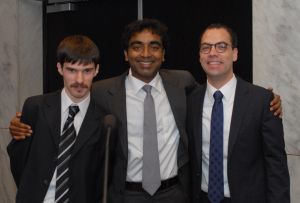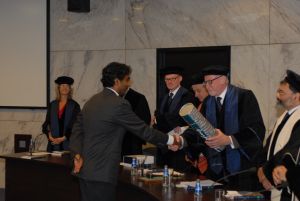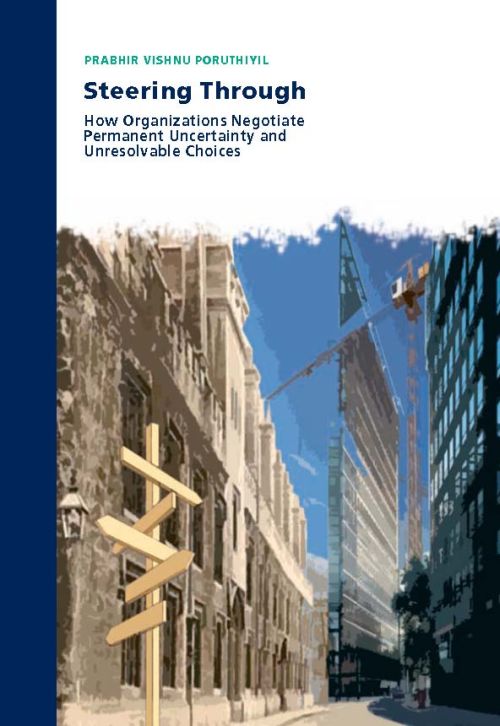Steering Through: How Organizations Negotiate?Permanent Uncertainty and Unresolvable Choices
Multinational companies, public bureaucracies, and individuals often have to function in societies devoid of permanent institutions and common agreements on moral preferences. In his PhD thesis entitled Steering Through: How Organisations Negotiate Permanent Uncertainty and Unresolvable Choices, Prabhir Vishnu Poruthiyil describes the process through which organisations negotiate and steer through the divergent conflicting demands that arise from such a fractured and transforming global society. His thesis gives support to concepts in business ethics and organisation theory that resonate with and can capture organisational processes in order to negotiate this dynamic, multi-level environment.
 Vishnu’s first case is a public debate that erupted between multinational company and social activists on the alleged violations of labour rights in the former’s production units in a developing country. Using this case as the backdrop, the study tests those streams of literature in business ethics that have tried to grapple with moral ambiguity and develop ethical positions for multinationals engaged in global production. The second case, an ethnography of a highly professional but politicised organisation, is used to determine the mechanisms through which self-damaging tendencies (hypocrisy), in spite of causing a near-death experience in the past, continues to be included in the organisational members’ repertoire. The current business environment has resulted in instances where private sector organisations have barely overcome crises by virtue of tenuous support from the public interests. Vishnu study gives a speculative but plausible reflection of how such professional managements with political owners might function as they attempt to recover.
Vishnu’s first case is a public debate that erupted between multinational company and social activists on the alleged violations of labour rights in the former’s production units in a developing country. Using this case as the backdrop, the study tests those streams of literature in business ethics that have tried to grapple with moral ambiguity and develop ethical positions for multinationals engaged in global production. The second case, an ethnography of a highly professional but politicised organisation, is used to determine the mechanisms through which self-damaging tendencies (hypocrisy), in spite of causing a near-death experience in the past, continues to be included in the organisational members’ repertoire. The current business environment has resulted in instances where private sector organisations have barely overcome crises by virtue of tenuous support from the public interests. Vishnu study gives a speculative but plausible reflection of how such professional managements with political owners might function as they attempt to recover.
Prabhir Vishnu Poruthiyil defended his dissertation at Rotterdam School of Management, Erasmus University (RSM) on 30 September 2011. His promoter was <link people pursey-heugens _blank>Prof.dr. Pursey Heugens. His co-promoter was <link people slawomir-magala _blank>Prof.dr. Slawek Magala. Other members of the Doctoral Committee were Prof.dr. Hans van Oosterhout, Prof.dr. Gail Whiteman of RSM and Prof.dr. Ewald Engelen of University of Amsterdam.
About Prabhir Vishnu
 Prabhir Vishnu Poruthiyil (1975, India) completed his master’s in Development Studies from the Institute of Social Studies (ISS), The Hague, The Netherlands. Vishnu’s specific areas of interest are the social impact of globalisation and the intertwined futures of multinational businesses and poverty alleviation in developing countries. To complement his academic exposure, Vishnu has set up a consultancy firm assisting global small and medium enterprises to develop socially responsible suppliers in developing countries. This also involves assisting developing country suppliers improve their production systems to suit global requirements of social responsibility.
Prabhir Vishnu Poruthiyil (1975, India) completed his master’s in Development Studies from the Institute of Social Studies (ISS), The Hague, The Netherlands. Vishnu’s specific areas of interest are the social impact of globalisation and the intertwined futures of multinational businesses and poverty alleviation in developing countries. To complement his academic exposure, Vishnu has set up a consultancy firm assisting global small and medium enterprises to develop socially responsible suppliers in developing countries. This also involves assisting developing country suppliers improve their production systems to suit global requirements of social responsibility.
Abstract of Steering Through: How Organizations Negotiate Permanent Uncertainty and Unresolvable Choices

It is easy to observe instances of contradictions and dilemmas that multinational companies, public bureaucracies, and individuals encounter as they seek resources and markets in a globally-linked world. The default condition for such entities is that they are being constantly stretched apart by global and local processes that are multiple, intertwined, contradictory and irreconcilable. Through qualitative studies of two such organisational environments, this thesis describes its unpredictable nature and highlights the deftness and dexterity required from actors to steer the organisations they manage through this complex thicket and promote the interests they espouse. The first case suggests that when faced with intractable dilemmas emanating from their global activity, multinational actors resort to arbitrary moral commitments. The second case suggests that powerless organisations relying on mutually contradictory political alliances may deliberately opt for hypocrisy; the strategy continues to be preferred in spite of having resulted in a near-death experience in its past. Jointly, these cases support concepts in business ethics and organisation theory that incorporate conflict, contradictions, and contingent causality into their explanations as they provide a better reflection of contemporary multinational and organisational activity.


